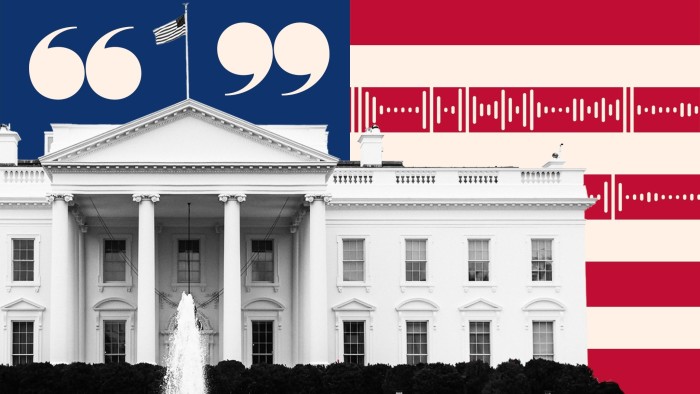JD Vance vaulted on to the national stage back in 2016 with the publication of a bestselling memoir, Hillbilly Elegy, about his upbringing in white, working-class America. At the time, he described himself as a “never Trump guy”.
Eight years later Vance is a Republican senator and one of Donald Trump’s fiercest defenders. A frequent surrogate for the Trump campaign on television, Vance is widely seen as a top contender to be the former president’s running mate in the 2024 election.
While Trump has not said whom he will select as his vice-president, an announcement is expected in a matter of days. The Republican National Convention will open on Monday, when delegates will officially nominate the presidential ticket.
While Trump has also flirted with the idea of selecting North Dakota Governor Doug Burgum or Florida Senator Marco Rubio as his running mate, speculation that he would pick Vance went into overdrive this week after Axios reported that Donald Trump Jr — a close friend with whom Vance texts on a near daily basis, according to one person familiar with the relationship — would speak right before his father’s vice-presidential pick at the convention.
But the candidate on Friday described his search for a vice-president as a “highly sophisticated version of The Apprentice”, as he suggested in a talk radio interview that he was still considering “four or five” people for the job. The former president said he would “love” to announce his pick “during the convention, or just slightly before the convention, like Monday”.
Representatives for the Trump campaign and Vance did not respond to requests for comment.
Vance’s potential elevation to being a heartbeat away from the presidency marks a remarkable rise for the 39-year-old US Marine Corps veteran and Yale Law School graduate who worked in venture capital before turning to politics. It also provides another example of a Republican who went from a “never Trumper” to a loyal acolyte and a glimpse into how the Maga movement, and the wider Republican party, might look in a post-Trump era.
Vance has embraced an isolationist foreign policy vision and has been among the loudest Republican voices opposing more US aid to Ukraine. He has also attracted sharp criticism for embracing Trump’s claims that the 2020 presidential election was fixed, including saying that if he had been in the US Senate at the time he would have voted against certifying the results on January 6 2021.
But it is Vance’s brand of economic populism that has divided the business community. Vance, whose 2022 Senate campaign was bankrolled in part by PayPal founder Peter Thiel, has vocal fans in Silicon Valley. He helped organise a high-profile fundraiser for Trump in San Francisco last month hosted by tech investors David Sacks and Chamath Palihapitiya.
Yet his ideological approach has raised alarm bells among more traditional Republicans on Wall Street and beyond who are worried the Ohio senator will be in a position to persuade Trump and shape the party platform for years to come.
“We are very concerned about JD Vance playing an outsized role in a Trump administration,” said one big bank lobbyist. “Trump populism and Vance populism are not the same.”
“He represents a populist mindset, and he is clearly smart and considered the future of the party,” said another financial services lobbyist, who described Vance as an “intellectual powerhouse”.
“He represents something in the country that the coastal elites and big business have taken too long to recognise,” the lobbyist added, in an apparent reference to Vance’s ability to channel the anger and disenfranchisement of the working classes.
Vance has espoused a protectionist trade policy, stricter immigration laws, higher minimum wages and a more aggressive approach to antitrust enforcement. He made headlines earlier this year when he described Federal Trade Commission chair Lina Khan as one of the Biden administration officials “doing a pretty good job”.
Those kind of comments have concerned investors in particular. One top New York dealmaker said picking Vance as vice-president “would not be reassuring to the business community, and could signal an anti-M&A mindset for the second Trump administration”.
One private equity investor said there was “no question” Trump was “better [than Joe Biden] for Wall Street as well as business broadly”, but added: “He needs to stick to a pro-business agenda and he’ll win . . . we don’t need a Republican Bernie Sanders.”
People close to Vance push back on any comparisons between the Ohio senator and Sanders, a self-described Democratic socialist who has long been a leader on the left.
“Vance doesn’t hate capitalism. He doesn’t hate business. He loves it . . . he loves creation . . . it is not like Sherrod Brown’s or Bernie Sanders’ nostalgia . . . it is not that longing for the static society,” said one longtime friend, referring to the Democrat Ohio senator.
Mark Kvamme, an Ohio-based venture capitalist who has raised money for Vance, described the senator as a “business guy” and a “clear thinker”.
“Some people see him as an ideologue. I don’t see that at all. I see him as a guy who thinks through the issues,” Kvamme said. “He is very methodical.”
Those same allies are also quick to defend Vance’s journey from Trump critic to Trump loyalist, arguing that the Hillbilly Elegy author who was once feted by coastal elites has always been at his core an ally of the white, working-class community that shaped his early childhood.
As one Republican operative who is close to Vance put it: “He has always viewed himself not as an elite but as somebody who wants to fight for the working class.”
Additional reporting by Brooke Masters and James Fontanella-Khan in New York
Have your say

Joe Biden vs Donald Trump: tell us how the 2024 US election will affect you
Credit: Source link














